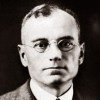Let us then admit that there are two histories: the actual series of events that once occurred; and the ideal series that we affirm and hold in memory. The first is absolute and unchanged — it was what it was whatever we do or say about it; the second is relative, always changing in response to the increase or refinement of knowledge. The two series correspond more or less, it is our aim to make the correspondence as exact as possible; but the actual series of events exists for us only in terms of the ideal series which we affirm and hold in memory.
Carl L. Becker (1873-1945) American historian
“Everyman His Own Historian” (1), speech, American Historical Association, Minneapolis (29 Dec 1931)
(Source)
Quotations by:
Becker, Carl
To establish the facts is always in order, and is indeed the first duty of the historian; but to suppose that the facts, once established in all their fullness, will “speak for themselves” is an illusion.
Carl L. Becker (1873-1945) American historian
“Everyman His Own Historian” (3), speech, American Historical Association, Minneapolis (29 Dec 1931)
(Source)
Left to themselves, the facts do not speak; left to themselves they do not exist, not really, since for all practical purposes there is no fact until some one affirms it.
Carl L. Becker (1873-1945) American historian
“Everyman His Own Historian” (3), speech, American Historical Association, Minneapolis (29 Dec 1931)
(Source)
However accurately we may determine the “facts” of history, the facts themselves and our interpretations of them, and our interpretation of our own interpretations, will be seen in a different perspective or a less vivid light as mankind moves into the unknown future. Regarded historically, as a process of becoming, man and his world can obviously be understood only tentatively, since it is by definition something still in the making, something as yet unfinished. Unfortunately for the “permanent contribution” and the universally valid philosophy, time passes; time, the enemy of man as the Greeks thought; to-morrow and to-morrow and to-morrow creeps in this petty pace, and all our yesterdays diminish and grow dim: so that, in the lengthening perspective of the centuries, even the most striking events (the Declaration of Independence, the French Revolution, the Great War itself; like the Diet of Worms before them, like the signing of the Magna Carta and the coronation of Charlemagne and the crossing of the Rubicon and the battle of Marathon) must inevitably, for posterity, fade away into pale replicas of the original picture, for each succeeding generation losing, as they recede into a more distant past, some significance that once was noted in them, some quality of enchantment that once was theirs.
Carl L. Becker (1873-1945) American historian
“Everyman His Own Historian” (3), speech, American Historical Association, Minneapolis (29 Dec 1931)
(Source)
If the thought or substance is fully mastered, the style will take care of itself. Good style in writing is like happiness in living — something that comes to you, if it comes at all, only if you are pre-occupied with something else: if you deliberately go after it, you will probably not get it.
Generally speaking, men are influenced by books which clarify their own thought, which express their own notions well, or which suggest to them ideas which their minds are already predisposed to accept.
Carl L. Becker (1873-1945) American historian
The Declaration of Independence, ch. 2 “Natural Rights Philosophy” (1922)
(Source)
Since history is not an objective reality, but only an imaginative reconstruction of vanished events, the pattern that appears useful or agreeable to one generation is never entirely so to the next.
Carl L. Becker (1873-1945) American historian
The Heavenly City of the Eighteenth-Century Philosophers (1932)
(Source)
Great as our differences are, all of us — professors, politicians, preachers — would no doubt find that we had much in common after all if it were possible to meet in the flesh some distinguished representatives from a former age.
It is from the ruins of the Capitol that we perceive, as from a great distance, a thousand years filled with dim shapes of men moving blindly, performing strangely, in an unreal shadowy world.
Carl L. Becker (1873-1945) American historian
The Heavenly City of the Eighteenth-century Philosophers, “The New History” (1932)
(Source)

